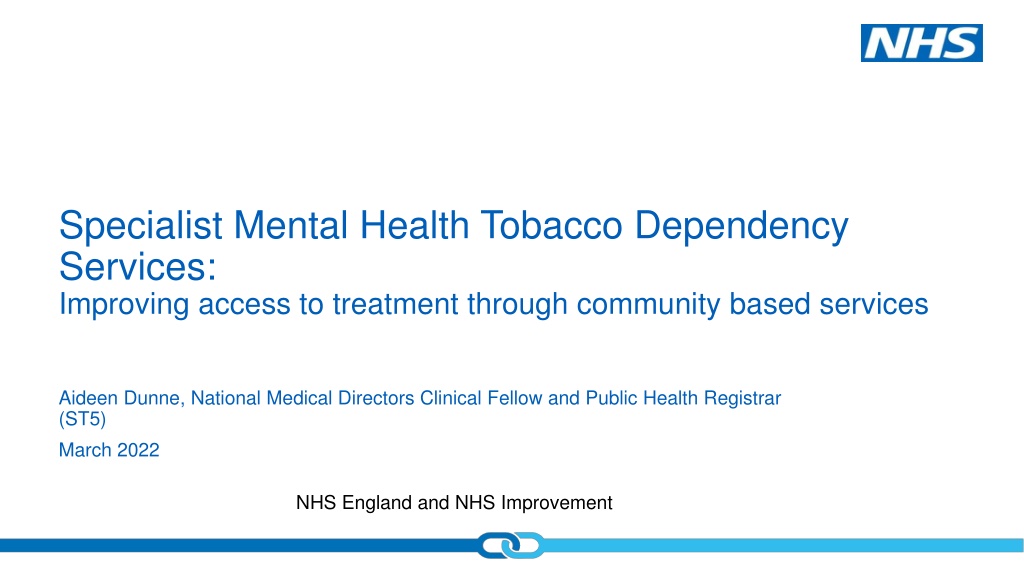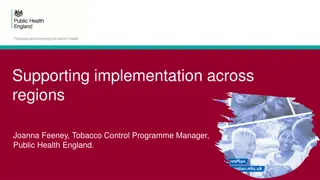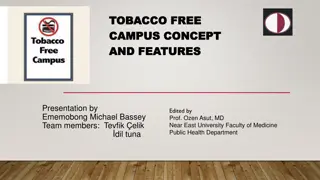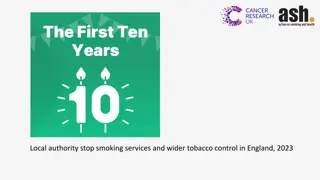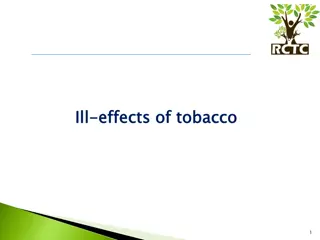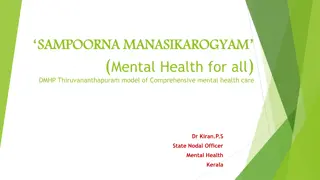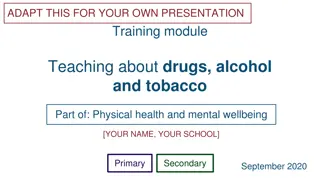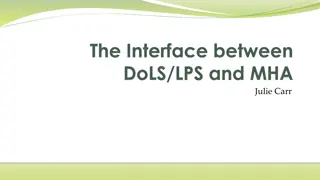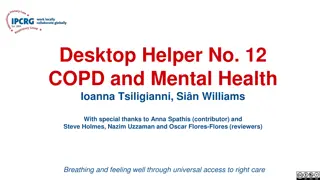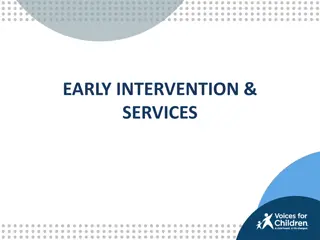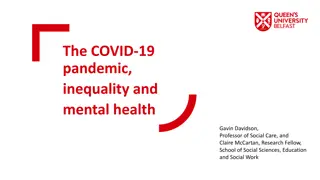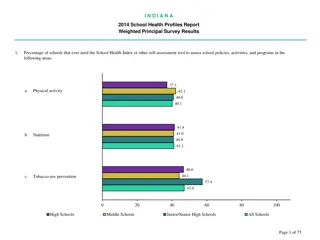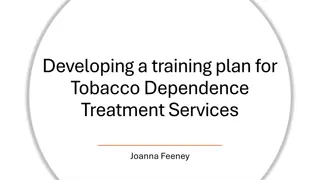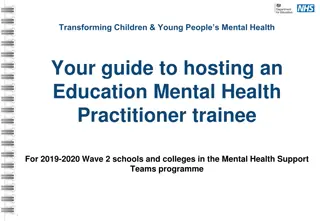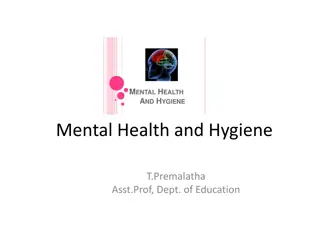Specialist Mental Health Tobacco Dependency Services: Improving Access to Treatment
Tobacco dependency in individuals with severe mental illness poses significant health inequalities, with higher smoking rates and associated harm. Tailored tobacco dependency services are crucial in addressing this issue and reducing excess mortality among this population. The commitment to delivering effective treatment through community-based services and within inpatient settings is essential in combating smoking-related disparities in mental health care.
Download Presentation

Please find below an Image/Link to download the presentation.
The content on the website is provided AS IS for your information and personal use only. It may not be sold, licensed, or shared on other websites without obtaining consent from the author. Download presentation by click this link. If you encounter any issues during the download, it is possible that the publisher has removed the file from their server.
E N D
Presentation Transcript
Specialist Mental Health Tobacco Dependency Services: Improving access to treatment through community based services Aideen Dunne, National Medical Directors Clinical Fellow and Public Health Registrar (ST5) March 2022 NHS England and NHS Improvement
Tobacco dependency is a driver of health inequalities in people with SMI There is very clear evidence of increased smoking rates and smoking-related harm among people with severe mental illness: Smoking is one of the most important modifiable risk factor that contributes towards the excess mortality in people with SMI1. It is estimated that 50% of deaths in people with SMI are attributable to smoking2. The prevalence of smoking in people with SMI is significantly higher compared to the general population (40.5% compared with 13.9%)3with rates as high as 70% in people with schizophrenia and bipolar disorder1. Smoking is a deeply entrenched and complex behaviour in people with SMI. People with mental illness are also more likely to be heavier and more dependant smokers4. It is estimated that a third of all cigarettes smoked in England are smoked by people with a mental disorder5. There is evidence that a tailored/enhanced tobacco dependency treatment offer is likely to be more effective in people with SMI6. 1. 2. 3. 4. 5. 6. Peckham et al (2017) Smoking cessation in severe mental ill health: what works? An updated systematic review and meta-analysis Centre for Mental Health (2020) A time to quit Office for Health Improvement and Disparities (2022). Local Tobacco Control Profiles Rethink (2020) A time to quit. Experiences of smoking cessation support among people with severe mental illness. Public Health England (2020) Health matters: smoking and mental health Gilbody et al (2019) Smoking cessation for people with severe mental illness (SCIMITAR+): a pragmatic randomised controlled trial 2 | 2 | Specialist Mental Health Tobacco Dependency Services
Delivering the LTP commitments The Marmot review (2020) 1highlights the importance of place in shaping people s physical and mental health, this includes; Organisational policies Treatment availability Social and cultural norms - mostly driven by staff and patients Establishing tobacco dependency services within a place and the extent to which they are effectively embedded are impacted by relevant organisational policies being fully implemented, the timely availability of high quality and NICE aligned treatment options, staff attitudes and behaviours that support patients/clients into treatment. The inpatient tobacco dependency services focus on place being acute and mental health trusts, and this commitment is also complemented by the NHS staff tobacco offer currently being rolled out. Place based approaches also refer to communities that people exist within, and the community based specialist tobacco dependency services aim to improve access outside of inpatient settings. 1. Marmot et al. (2020) Health equity in England: The Marmot Review 10 years on. 3 | 3 | Specialist Mental Health Tobacco Dependency Services
Specialist tobacco dependency services for people with SMI We are now progressing our third tobacco related LTP commitment: A new universal smoking cessation offer will also be available as part of specialist mental health and learning disability services . In operationalising this commitment we faced a number of challenges: There is no universal definition of what good looks like in practice and therefore there are a number of variations of a service model being delivered There was no clear understanding of the cost to deliver these services (given that they were not universally available and where they were provided there was variation in what was delivered) The evidence base for tobacco dependency in people with SMI is less developed than for the general population and some high risk groups. We had a number of factors in our favour: There were established expert and reference groups that were very passionate about these services There were some excellent examples of this type of service being delivered that we could learn from We had an example of a robustly tested intervention in the UK (SCIMITAR) Working with service providers, key academic and topic experts and national organisations we developed a proposed service model that was further tested during a Task and Finish Group. 4 | 4 | Specialist Mental Health Tobacco Dependency Services
Proposed model of what good in practice looks like 1. Systematic identification of people that smoke and they are offered an opt out referral 2. Services are delivered by a dedicated stop smoking advisor with mental health expertise/experience 3. Clients are offered support that is tailored in duration and intensity to their needs 4. All NICE recommended treatment options are available and offered to clients 5. Flexibility in terms of lead time before setting a quit date, supporting a harm reduction approach/ structured cut down 6. Flexibility in terms of how and where appointments are delivered focusing on what is best for the client 7. Good communication with the client s clinical team inform medicines review 8. Sessions may continue after the quit date for a duration and intensity that is tailored to the client s needs Through our engagement we also recognised that additional aspects may be best determined at a local level. 5 | 5 | Specialist Mental Health Tobacco Dependency Services
Patient Pathways Targeted services for people with SMI should be enhanced by improving systems for identifying people within primary care and [secondary] mental health settings. We defined three patient pathways that these services could sit within, linking in with existing systems, services and infrastructure: Co-locating services in primary care linking with the physical health check for people with SMI Building on the inpatient offer to patients post discharge and linking with outpatient clinics Co-locating services with community mental health services adopting a making every contact count approach 6 | 6 | Specialist Mental Health Tobacco Dependency Services
Early implementer sites Early Implementer Sites offer the opportunity to bridge the gap between research and practice, and understand from an operational perspective what good looks like. They will also play an important role in informing the national rollout of services in 2024/25. We have been working with NHS EI Regions to identify 7 Early Implementer Sites to be mobilised in 2022/23. 2 EIS delivering the Inpatient/ Outpatient Model 7 Early Implementer Sites NENC: Primary Care Model 2 EIS delivering the Primary Care Model CM: CMHS Model Nottinghamshire: Inpatient/Outpatient N&W: Primary Care Model 3 EIS delivering CMHS Model NEL: CMHS model Sussex: Inpatient/Outpatient C&IoS: CMHS model 7 | 7 | Specialist Mental Health Tobacco Dependency Services
Early Implementer Sites 1. North East & Yorkshire: North East North Cumbria Primary Care Model 2. North West: Cheshire and Merseyside Community Mental Health Services Model 3. Midlands: Nottingham and Nottinghamshire Inpatient/ Outpatient Model 4. East of England: Norfolk and Waverly Primary Care Model 5. London: North East London Community Mental Health Services Model 6. South East: Sussex Inpatient/ Outpatient Model 7. South West: Cornwall and Isles of Scilly Community Mental Health Services Model 8 | 8 | Specialist Mental Health Tobacco Dependency Services
Next steps Mobilisation of EIS Evaluation and data collection Deliver a further three Task and Finish Group focused sessions Learning infrastructure to support service mobilisation Evaluation (Part 2) Co-Production and what good looks like Developing a plan for the National roll out 9 | 9 | Specialist Mental Health Tobacco Dependency Services
